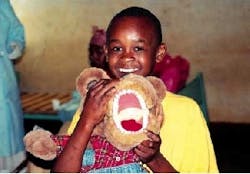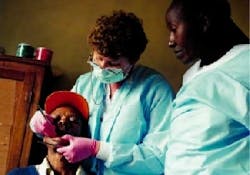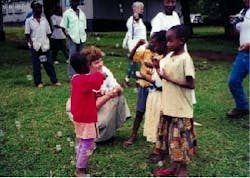OUT OF AFRICA
Karibu! That's a Swahili word meaning "to come in" or "welcome." Welcome is exactly how I felt while visiting Tanzania, a country located in eastern Africa that offers a "true African experience" to any visitor. From the mountaintops of Mount Kilimanjaro to the plains of the Serengeti to the shores of the Indian Ocean, there is much to see and experience. Snow-capped mountains, vast plains where herds of animals roam, and traditional warriors make the country an exciting destination to visit. - The author (left) walks hand-in-hand with one of her Tanzanian hosts, illustrating the meaning of "pamoja." The author works on a patient as Tanzanian partner Estarose Mwanga watches (near left, inset). Sharing bubbles with the children (far left, inset) was one of the author's favorite memories.
I recently participated in a dental mission assignment at the Masama Girls School in Moshi. The school is located on top of a mountain in the foothills of Mount Kilimanjaro, Africa's tallest mountain. Our team's goal was to restore the school's classrooms. I provided preventive dental care for the school's staff and students who were present to assist in the restoration project.
The school is home to more than 250 secondary female students and has had little to no upkeep since it was opened 25 years ago. Our group raised funds to repair and paint the walls, replace the broken windows and doors, and replace the asbestos roofs.
The dental clinic was housed in the school's dispensary. The office was transformed into an operatory where I provided therapeutic scaling and prophies. The infirmary became the dental education classroom where oral hygiene care was taught. The school's staff, students, and village people from the mountain were my clients. It didn't take long for word to travel throughout the village. Many came seeking other medical advice, hoping to spare themselves from the trip to town, which was more than 20 miles away. The oral hygiene instructions were well-received and the products donated by Colgate, Thompson Dental Company, and Southern Anesthesia & Surgical were greatly appreciated.
Our team was comprised of 24 individuals from North and South Carolina who came from all walks of life. Each team member was paired up with a Tanzanian, and it didn't take long for a friendship to bud. In a matter of minutes, the groups were peering in geography books, pointing out locations and sharing cultures.
My partner was Estarose Mwanga, the school's nurse. After overcoming our language barrier, my partner was instrumental in taking medical histories and giving oral hygiene instructions. One of the school's English teachers, Flora David, wanted to try her hand at dentistry. She became an expert in tooth-brushing techniques and coronal polishing. A nurse from North Carolina, Francine Davis, also lent a hand in the dental clinic. Dental care is a luxury in this country, which has only 30 dentists to share among its more than 30 million people.
The motto of the project was "pamoja," a Swahili word meaning "togetherness" or "unity." This word was chosen because the American and Tanzanian groups worked together on all projects. We had morning tea and lunch together. We shared devotions, music, and stories from our respective countries. We painted and repaired the classrooms and the dental clinic. The Americans learned much about the culture of Tanzania, and we had fun sharing our culture as well. We introduced the Tanzanians to paint rollers, peanut butter, and bubbles. We laughed as we watched our new friends take turns rolling paint, making a mundane task fun. Peanut butter was a hit as well, and we were amused as we watched them spread peanut butter on their bananas. They shared their version of peanut butter, which was bread covered in butter and sprinkled with peanuts. The bubbles kept the children content as they chased them in the field adjacent to the school.
Our trip certainly wasn't all work and no play. We had the opportunity to visit churches, schools, hospitals, and homes. We were greeted warmly everywhere we went. As a group, we learned to be grateful for all that we have in America. Having so little, we were amazed at what the Tanzanians were able to accomplish.
No trip to Tanzania would be complete without an animal safari. We visited the Ngorongoro Crater and the Serengeti. We saw lions, elephants, zebras, and so much more. We visited the Olduvai Gorge, a natural trench hewn out of the Serengeti Plain that contains walls of exposed fossil-bearing strata dating from 2 million years ago. We also visited a Maasai community. The Maasai have resisted change over the century and still cling to their traditional lifestyles. They still live in huts made from dung and mud, and they wear only red and blue blankets.
Our last day at the Masama Girls School was a day of celebration. There was much joy over the work that was completed. We planted trees in honor of the project and drank Cokes - a treat for the Tanzanians - and exchanged small gifts with our partners. We gave the Tanzanians T-shirts with our "pamoja" logo on them, as well as souvenirs from North and South Carolina. I gave my partner my clinic shoes to replace her worn-out shoes, and she gave me a used, hand-embroidered table runner.
We were saddened by the fact that we couldn't be at the school when the children returned from their break. We wanted to see the surprised looks on their faces, but we know that the work at the school and in the clinic will make a difference to this community. The Tanzanians may remember our visit for some time, but it is a trip that many in our group, including myself, will never forget. Although we were a world apart in many ways, the Tanzanians and the Americans came together - "pamoja" - and made a difference in each other's lives.
Catherine Milejczak, CDA, RDH, BHS, works in Columbia, S.C., as the infection control coordinator and lab manager for the Health Sciences Department at Midlands Technical College. She also works part-time as a hygienist in a Columbia practice. She can be reached at [email protected].
How CAN YOU BECOME involved IN dental mission trips?
According to Catherine Milejczak, "There are many organizations that offer opportunities for dental mission assignment in both domestic and overseas areas. For me, the best way to get involved was through local church organizations. One could call the regional church office of the denomination of his or her choice and ask who is participating in mission assignment. Three of my trips were with the South Carolina Baptist Convention, and my trip to Tanzania was with the South Carolina Lutheran Synod. With these groups, you have to be somewhat aggressive to make the dental assignment work - you have to collect supplies and set up your own clinics, etc."
National organizations include:
The Flying Doctors
www.flyingdocs.org
(800) 585-4568
Episcopal Medical Missions Foundation
www.emmf.com
(713) 334-0128
Operation Smile
www.operationsmile.com
(757) 321-7645
Mission Finder
www.mfinder.org/medical.htm
(208) 723-4657
Or look on any Internet search engine for "dental missionary."


